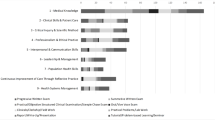Abstract
The worldwide call for a shift towards competency based postgraduate medical education has until recently gone largely unheeded in India, despite the Medical Council of India enshrining the principle in its regulations for postgraduate institutions. This paper details the first concrete attempt at establishing a CBME curriculum in Otorhinolaryngology in India. The design and implementation of the CBME curriculum was carried out in four phases, in a time-bound manner over a period of 6 months. Phase I consisted of an extensive literature review and a clarification of the major objectives of the program. Phase II involved the listing out of 20–30 entrustable professional activities (EPAs) for each specialty and the 13 core EPAs common to all incoming residents and the subsequent mapping of these EPAs to their respective domains of competence and year-wise levels of competence. This was followed by the development of milestones for each EPA and appropriate clinical vignettes. Phase III focused on development of 360° assessment strategies, including the in-house development of an e-portfolio. Phase IV was dedicated to the implementation of the CBME curriculum, and involved various sensitization and orientation programs for faculty and the new residents. This exercise in designing and implementing a CBME program showed the important role that intra-departmental and inter-institutional cross-communication and exchange of ideas vies-a-vie workshops and personal communication play in bridging the lapses in knowledge in this emerging area, reaching consensus to achieve project goals and for finding relevant solutions to common problems. Medical education in India presents its own peculiar set of logistical and cultural challenges. Keeping in line with the recommendations of the Medical Council of India regarding Postgraduate Medical Education, it is essential that medical colleges in India not fall behind the international paradigm shift towards CBME.

Similar content being viewed by others
References
Carraccio C, Wolfsthal SD, Englander R, Ferentz K, Martin C (2002) Shifting paradigms: from Flexner to competencies. Acad Med 77:361–367
Swing SR (2007) The ACGME outcome project: retrospective and prospective. Med Teach 29:648–654
Frank JR (ed) (2005) The CanMEDS 2005 physician competency framework. Royal College of Physicians and Surgeons of Canada, Ottawa, Ontario, Canada. http://www.royalcollege.ca/portal/page/portal/rc/common/documents/canmeds/resources/publications/framework_full_e.pdf. Accessed 19 Mar 2017
Scottish Deans’ Medical Curriculum Group (2007) Learning outcomes for the medical undergraduate in scotland: a foundation for competent and reflective practitioners. 3rd edn. http://www.scottishdoctor.org/resources/scottishdoctor3.doc. Accessed 19 Mar 2017
Laan RFJM, Leunissen RRM, van Herwaarden CLA (2010) The 2009 framework for undergraduate medical education in the Netherlands. GMS Z Med Ausbild 27(2):Doc35
Medical Council of India Postgraduate Medical Education Regulations (2000) http://www.mciindia.org/Rulesand-Regulation/Postgraduate-Medical-Education-Regulations-2000.pdf. Accessed 19 Mar 2017
Baum KD, Axtell S (2005) Trends in North American medical education. Keio J Med 54(1):22–28
Neufeld VR, Maudsley RF, Pickering RJ, Turnbull JM, Weston WW, Brown MG et al (1998) Educating future physicians for Ontario. Acad Med 73:1133–1148
Long DM (2000) Competency-based residency training: the next advance in graduate medical education. Acad Med 75:1178–1183
Wolf A (1995) Competence-based assessment. Open University Press, Buckingham
Frank JR, Mungroo R, Ahmad Y, Wang M, De Rossi S, Horsley T (2010) Toward a definition of competency-based education in medicine: a systematic review of published definitions. Med Teach 32(8):631–637
MedBiquitous Performance Framework Working Group. Performance framework—definitions. http://groups.medbiq.org/medbiq/display/CWG/Performance+Framework+-+Definitions. Accessed 19 Mar 2017
Englander R, Cameron T, Ballard AJ, Dodge J, Bull J, Aschenbrener CA (2013) Towards a common taxonomy of competency domains for the health professions and competencies for physicians. Acad Med 88:1088–1094
Frank JR, Snell LS, Cate OT et al (2010) Competency based medical education: theory to practice. Med Teach 32:638–645
Ten Cate O (2005) Entrustability of professional activities and competency based training. Med Educ 39:1176–1177
Accreditation Council of Graduate Medical Education. https://www.acgme.org/acgmeweb/tabid/430/ProgramandInstitutionalAccreditation/NextAccreditationSystem/Milestones.aspx. Accessed 2007
Harden RM, Crosby JR, Davis MH (1998) AMEE guide no 14: outcome-based education: part I—an introduction to outcome-based education. Med Teach 21:7–14
Cooke M, Irby DM, O’Brien BC (2010) Educating physicians. A call for reform of medical school and residency. Jossey-Bass, San Francisco
Ibrahim H, Al Tatari H, Holmboe ES (2015) The transition to competency-based pediatric training in the United Arab Emirates. BMC Med Educ 15:65
Harden RM (2007) Outcome-based education: the ostrich, the peacock and the beaver. Med Teach 29:666–671
Hodges BD (2010) A tea-steeping or i-doc model for medical education? Acad Med J Assoc Am Med Coll 85(9 Suppl):S34–S44
Glover Takahashi S, Waddell A, Kennedy M, Hodges B (2011) Innovations, integration and implementation issues in competency-based training in postgraduate medical education. Members of the FMEC PG consortium
Frenk J, Chen L, Bhutta ZA et al (2010) Health professionals for a new century: transforming education to strengthen health systems in an interdependent world. Lancet 376:1923–1958
Acknowledgements
We would like to acknowledge the inspiration and leadership provided by Prof. Dr. K. R. Sethuraman, Vice Chancellor, Prof. Dr. M. Ravishankar, Dean (Administration), Prof. Dr. N. Ananthakrishnan, Dean (Research and Allied Health Sciences) and the efforts of Department of Information Technology, Sri Balaji Vidyapeeth University, Pondicherry.
Author information
Authors and Affiliations
Corresponding author
Rights and permissions
About this article
Cite this article
Karthikeyan, P., Pulimoottil, D.T. Design and Implementation of Competency Based Postgraduate Medical Education in Otorhinolaryngology: The Pilot Experience in India. Indian J Otolaryngol Head Neck Surg 71 (Suppl 1), 671–678 (2019). https://doi.org/10.1007/s12070-018-1474-5
Received:
Accepted:
Published:
Issue Date:
DOI: https://doi.org/10.1007/s12070-018-1474-5




